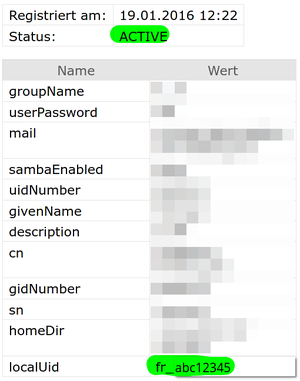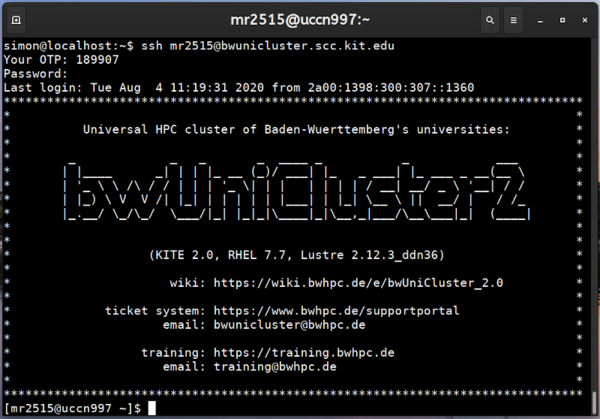Registration/Login: Difference between revisions
m (→Username) |
m (→Username) |
||
| Line 28: | Line 28: | ||
Prefixes are used to ensure that the usernames assigned by the home organization are unique within the state. |
Prefixes are used to ensure that the usernames assigned by the home organization are unique within the state. |
||
The username for the bwHPC clusters is the same as the one assigned by the university or college, but it is prefixed with two letters for the home institution. |
The username for the bwHPC clusters is the same as the one assigned by the university or college, but it is prefixed with two letters for the home institution. |
||
For users from KIT, however, there is an exception on the bwUniCluster (see table). |
|||
The following lists contain all prefixes currently in use. |
The following lists contain all prefixes currently in use. |
||
Revision as of 11:48, 18 February 2022
Login to the Clusters
|
Access to the clusters (bwUniCluster/bwForCluster) is restricted to IP addresses of universities/colleges from Baden-Württemberg (BelWü network). If you are outside the BelWü network (e.g. at home), you must first establish a VPN connection to your home university or a connection to an SSH jump host at your home university. |
After completing the web registration, the HPC cluster is ready for your SSH based login. The following options for SSH connections are recommended:
- Linux/MacOS: Use the
sshcommand (OpenSSH) in a terminal application. - Windows: Use the MobaXterm application. Alternatively, you can use virtual machines to run native Linux applications such as SSH. An easy way to use Linux on Windows is to install the "Windows Subsystem for Linux".
Hostnames and Login to bwUniCluster/bwForClusters
For specific instructions on logging in to the cluster and host names, see the following guides:
- If you want to login to the bwUniCluster, please refer to
→ bwUniCluster 2.0 Login - If you want to login to one of the bwForClusters, please refer to
→ BINAC
→ JUSTUS 2
→ MLS&WISO
→ NEMO
Username
All members of universities and colleges in Baden-Württemberg can use the bwHPC resources. Prefixes are used to ensure that the usernames assigned by the home organization are unique within the state. The username for the bwHPC clusters is the same as the one assigned by the university or college, but it is prefixed with two letters for the home institution. For users from KIT, however, there is an exception on the bwUniCluster (see table).
The following lists contain all prefixes currently in use.
| University | Prefix | Username bwUniCluster | Username bwForCluster |
|---|---|---|---|
| Universität Freiburg | fr | fr_<username> | |
| Universität Heidelberg | hd | hd_<username> | |
| Universität Hohenheim | ho | ho_<username> | |
| Karlsruhe Institute of Technology (KIT) | ka | <username> | ka_<username> |
| Universität Konstanz | kn | kn_<username> | |
| Universität Mannheim | ma | ma_<username> | |
| Universität Stuttgart | st | st_<username> | |
| Universität Tübingen | tu | tu_<username> | |
| Universität Ulm | ul | ul_<username> | |
| HAW BW e.V. | Prefix | Username bwUniCluster/bwForCluster |
|---|---|---|
| Hochschule Aalen | aa | aa_<username> |
| Hochschule Albstadt-Sigmaringen | as | as_<username> |
| Hochschule Esslingen | es | es_<username> |
| Hochschule Heilbronn | hn | hn_<username> |
| Hochschule Karlsruhe | hk | hk_<username> |
| Hochschule Konstanz (HTWG) | ht | ht_<username> |
| Hochschule Mannheim | mn | mn_<username> |
| Hochschule Offenburg | of | of_<username> |
| Hochschule Reutlingen | hr | hr_<username> |
| Hochschule Rottenburg | ro | ro_<username> |
| Hochschule Stuttgart (HfT) | hs | hs_<username> |
| Hochschule Ulm | hu | hu_<username> |
Alternatively, you can log in to the registration service and verify your username online. To do this, follow the next steps:
1. Select the cluster you want to know your username for:
→ bwUniCluster 2.0
→ BINAC
→ JUSTUS 2
→ MLS&WISO
→ NEMO
2. Select your home organization from the list and click Proceed.
3. Enter your home-organisational user ID / username and your home-organisational password and click Login button.
4. You will be redirected back to the registration website.
5. Find the cluster entry and select Registry Info.
6. Depending on the registration service, you will see one of the following entries. See Username for login or localUid for your username.
SSH Clients
The following clients are recommended using the bwHPC clusters.
For <username> see section "Username", for <hostname> see the specific cluster instructions in section "Hostnames and Login to bwUniCluster/bwForClusters".
Command Line SSH
Most Unix and Unix-like operating systems like Linux, macOS and *BSD come with a built-in SSH client provided by the OpenSSH project. More recent versions of Windows 10 using the Windows Subsystem for Linux also come with a built-in OpenSSH client.
To use this client, simply open a command line terminal (the exact process differs on every operating system, but usually involves starting an application called Terminal or Command Prompt) and enter the following command to connect to a cluster:
$ ssh <username>@<hostname>
If you are on a Linux or Unix system running the X Window System (X11) and want to use a GUI-based application, you can use the -X option for the ssh command to set up X11 forwarding:
$ ssh -X <username>@<hostname>
Windows users requiring X11 forwarding for graphical applications should use MobaXterm instead.
MobaXterm
The bwHPC support team strongly recommends to use MobaXterm instead of PuTTY or WinSCP on Windows. MobaXterm provides a built-in X11 server allowing to start GUI based software.
Start MobaXterm, fill in the following fields:
Remote name : <hostname> Specify user name : <username> Port : 22
Click 'OK'. A terminal will be opened and there you can enter your credentials.
FileZilla
Many GUI applications that support SFTP transfers on Linux don't work well with 2-factor authentication, e.g. Nautilus and Dolphin don't support it. A good alternative for Linux is FileZilla.
Start FileZilla, Select "File -> Site Manager..." from the main menu and set up a new connection with the following settings:
Protocol: SFTP - SSH File Transfer Protocol Host: <hostname> Logon Typ: Interactive User: <username>
Then click on the "Connect" button.
Files can be transferred between the local system and the cluster by navigating to the respective folders in the split file view and then either dragging files and folders between the views or by clicking on a file/folder with the right mouse button and then selecting "Upload" or "Download" from the menu.
Examples
- If you are a member of the University of Konstanz and your local username is
ab1234, your username on any bwHPC cluster iskn_ab1234.
- If your local username for the university is
vwxyz1234and you are a user from the University of Freiburg this would combine to the following SSH command:
ssh -l fr_vwxyz1234 <login>
- KIT users logging into bwUniCluster do not need to use a prefix, but if they are using a bwForCluster. If you are a KIT user and your username is
pxd27239, your login names would be for the clusters:- bwUniCluster:
pxd27239 - bwForCluster:
ka_pxd27239
- bwUniCluster:
Example login process for bwUniCluster 2.0
After the connection has been initiated, a successful login process will go through the following three steps:
1. The system asks for a One-Time Password. Generate one using the Software or Hardware Token registered on the bwIDM system (see Registration/2FA) and enter it after the Your OTP: prompt.
2. The systems asks for your service password. Enter it after the Password: prompt.
3. You are greeted by the bwUniCluster 2.0 banner followed by a shell.
The result should look like this:
Allowed Activities on Login Nodes
|
To guarantee usability for all the users of clusters you must not run your compute jobs on the login nodes. Compute jobs must be submitted to the queuing system. Any compute job running on the login nodes will be terminated without any notice. Any long-running compilation or any long-running pre- or post-processing of batch jobs must also be submitted to the queuing system. |
The login nodes of the bwHPC clusters are the access point to the compute system, your $HOME directory and your Workspaces.
These nodes are shared with all the users therefore, your activities on the login nodes are limited to primarily set up your batch jobs.
Your activities may also be:
- short compilation of your program code and
- short pre- and post-processing of your batch jobs.



